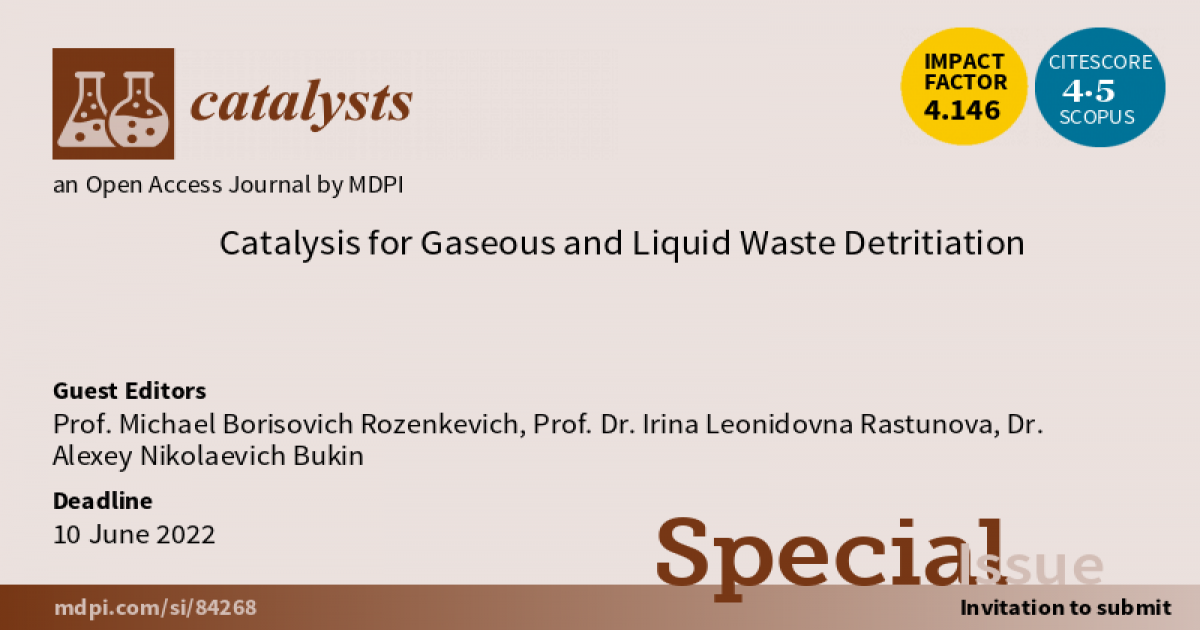Catalysis for Gaseous and Liquid Waste Detritiation
A special issue of Catalysts (ISSN 2073-4344). This special issue belongs to the section "Environmental Catalysis".
Deadline for manuscript submissions: closed (10 June 2022) | Viewed by 303

Special Issue Editors
Interests: separation of isotopes of light elements; theory and technology; catalysts in the separation of hydrogen isotopes; homogeneous catalysis; heterogeneous catalysis; photocatalysis
Interests: separation of isotopes of light elements; theory and technology; water detritiation processes; physicochemical methods
Interests: separation of isotopes of light elements; separation of hydrogen isotopes; technology for chemical isotopic exchange; catalysts for isotopic exchange of hydrogen with water
Special Issue Information
Dear Colleagues,
We invite you to present the results of your research for publication in a Special Issue of the journal Catalysts dedicated to the catalysts used in the detritiation of liquid radioactive waste and the technologies in which they are used. In many countries of the world that operate nuclear and thermonuclear energy facilities, these technologies are becoming increasingly important in connection with the tightening legislation that determines the permissible limits for the discharge of the radioactive isotope of hydrogen—tritium—into the environment. Regardless of the nature of the sources contaminated with tritium—solid, liquid, and gaseous—water is usually used as a working substance for the final process of the detritiation of the generated waste. Catalysts are used both at the stage of the conversion of a tritium-containing precursor into water (the oxidation of hydrogen or an organic compound) and at the stage of subsequent isotope separation in order to obtain a product purified from tritium and its concentrate (for example, catalytic chemical isotope exchange in a water–hydrogen system). A possible variant of the waste detritiation process is a complex scheme, at the final stage of which the hydrogen distillation process is used, in which catalysts also play an important role. The purpose of this Special Issue of the journal is to collect, in a concentrated form, both prospecting and already completed developments in the field of creating effective technologies for waste detritiation.
Submit your paper and select the Journal “Catalysts” and the Special Issue “Catalysis for Gaseous and Liquid Waste Detritiation” via: MDPI submission system. Please contact the Guest Editor or the journal editor (cicy.chen@mdpi.com) for any queries. Our papers will be published on a rolling basis and we will be pleased to receive your submission once you have finished it.
Prof. Michael Borisovich Rozenkevich
Prof. Irina Leonidovna Rastunova
Dr. Alexey Nikolaevich Bukin
Guest Editor
Manuscript Submission Information
Manuscripts should be submitted online at www.mdpi.com by registering and logging in to this website. Once you are registered, click here to go to the submission form. Manuscripts can be submitted until the deadline. All submissions that pass pre-check are peer-reviewed. Accepted papers will be published continuously in the journal (as soon as accepted) and will be listed together on the special issue website. Research articles, review articles as well as short communications are invited. For planned papers, a title and short abstract (about 100 words) can be sent to the Editorial Office for announcement on this website.
Submitted manuscripts should not have been published previously, nor be under consideration for publication elsewhere (except conference proceedings papers). All manuscripts are thoroughly refereed through a single-blind peer-review process. A guide for authors and other relevant information for submission of manuscripts is available on the Instructions for Authors page. Catalysts is an international peer-reviewed open access monthly journal published by MDPI.
Please visit the Instructions for Authors page before submitting a manuscript. The Article Processing Charge (APC) for publication in this open access journal is 2200 CHF (Swiss Francs). Submitted papers should be well formatted and use good English. Authors may use MDPI's English editing service prior to publication or during author revisions.
Keywords
- waste
- tritium
- environmental protection
- catalytic processes
- isotope exchange
- water
- hydrogen
Benefits of Publishing in a Special Issue
- Ease of navigation: Grouping papers by topic helps scholars navigate broad scope journals more efficiently.
- Greater discoverability: Special Issues support the reach and impact of scientific research. Articles in Special Issues are more discoverable and cited more frequently.
- Expansion of research network: Special Issues facilitate connections among authors, fostering scientific collaborations.
- External promotion: Articles in Special Issues are often promoted through the journal's social media, increasing their visibility.
- Reprint: MDPI Books provides the opportunity to republish successful Special Issues in book format, both online and in print.
Further information on MDPI's Special Issue policies can be found here.







